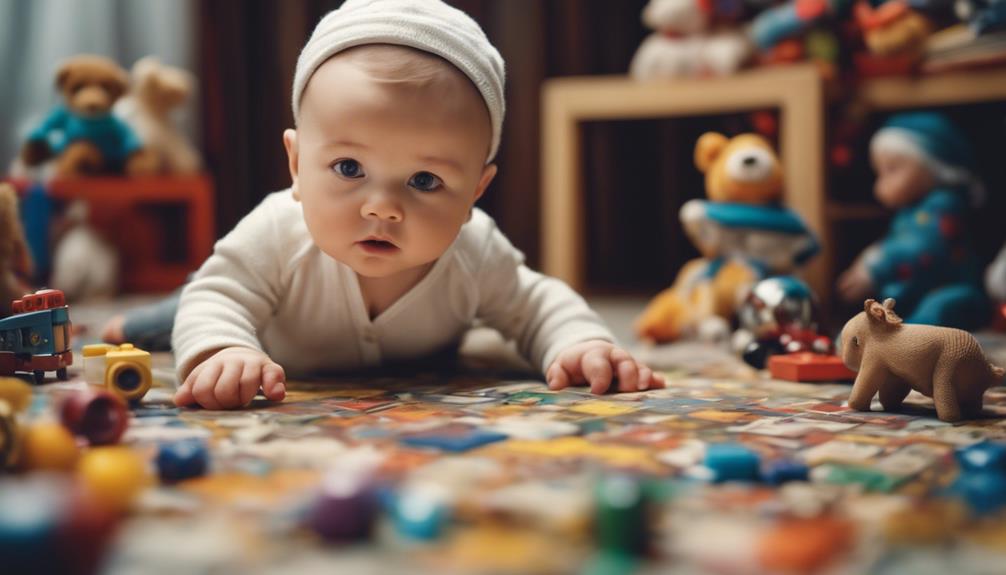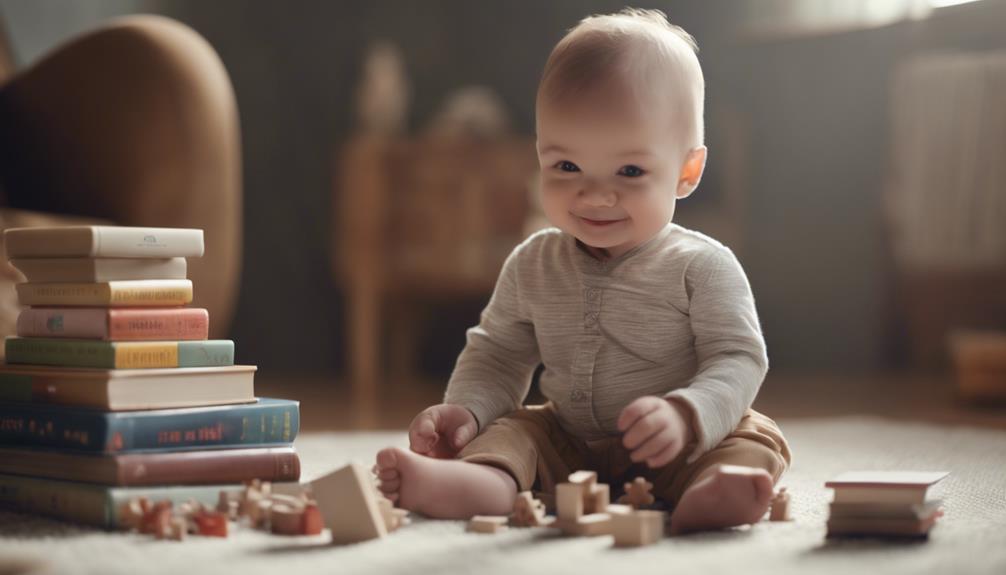To spot a strong-willed infant, observe signs of persistent behavior, intense reactions, resistance to changes in routine, defiance of authority, and early assertion of autonomy. Keep an eye out for self-directed actions indicating independence, reluctance to accept assistance, and a fondness for solo exploration. Determination is evident in the pursuit of goals, clear preferences, and a refusal to give up. Emotions like frustration are expressed boldly and openly, with assertive communication of preferences. These infants resist changes in routine, communicate effectively, and persist in tasks. Further signs can be discovered upon closer examination.
Key Takeaways
- Strong-willed babies resist help and assert independence.
- Preference for solo exploration indicates strong will.
- Clear expression of emotions, especially determination.
- Demonstrates unwavering focus and relentless pursuit of goals.
- Displays resistance to changes, clear likes, dislikes, and assertive communication.
Behaviors to Look Out For
Look out for specific behaviors that may indicate you have a strong-willed baby. Strong-willed children often resist changes in routine or shifts, preferring consistency and predictability. These kids may display intense reactions and strong emotions to communicate their needs effectively, showing determination and persistence in making their preferences known.
Behaviors such as persistent attempts to assert independence and a strong desire for autonomy and decision-making are common signs of a strong-willed child. You might notice your child exhibiting a willful nature, aiming to achieve their goals, even at a young age. Observing these behaviors can help you identify if your child falls into the category of being strong-willed.
Understanding these signs can assist you in nurturing and supporting your child's unique temperament and fostering a positive relationship with them as they grow and develop.
Signs of Independence

Strong-willed babies often demonstrate signs of independence through self-directed behavior patterns.
They may assert their autonomy by resisting help with daily tasks or showing a preference for exploring on their own.
These early signs of assertiveness can provide insight into the strong-willed nature of your baby.
Self-Directed Behavior Patterns
Babies demonstrating self-directed behavior patterns often resist assistance and assert their independence by making their own choices. They display a strong desire for autonomy, often showing determination and persistence in achieving their goals. This assertiveness can be seen in their actions as they navigate their world with a clear sense of self. Here is a table summarizing the self-directed behavior patterns commonly observed in strong-willed babies:
| Self-Directed Behavior Patterns | Description |
|---|---|
| Making Choices | Preferring to select toys or activities |
| Independence | Resisting help with tasks |
| Determination | Displaying persistence in achieving goals |
These self-directed behaviors are early signs of independence that can lay the foundation for a child's assertiveness and self-reliance. By understanding and supporting these traits, caregivers can help nurture a strong-willed baby's sense of autonomy and confidence.
Early Assertiveness Signs
How can you identify the initial signs of independence in a child?
Early signs of independence in babies often manifest through assertiveness and determination. These children may exhibit a strong will by resisting assistance with tasks like feeding or dressing themselves. They might assert their independence by showing clear preferences and reacting strongly to changes or disliked objects.
Additionally, strong-willed babies may demonstrate determination by persistently working towards achieving a goal, such as reaching for a toy that's out of their immediate grasp. Vocalizing desires is another common trait, with these babies expressing their needs and wants clearly and adamantly, even at a young age.
Moreover, signs of independence may be observed when these babies resist redirection or attempts to divert their attention from activities they've chosen. Being attentive to these early signs can help caregivers understand and support the emerging independence of their child.
Recognizing Determination

Recognizing determination in a strong-willed baby involves observing their persistent behavior patterns. This may include repeated attempts to achieve a specific goal. These babies are unyielding in their preferences, showing a clear inclination towards certain activities or objects.
Additionally, strong resistance to change is a key indicator of a determined baby. They often express displeasure when faced with alterations to their routine or surroundings.
Persistent Behavior Patterns
Through their persistent behavior patterns, strong-willed babies exhibit a remarkable determination that sets them apart from others. These spirited children show a strong-willed child's independence by refusing to give up on tasks and goals they have set for themselves. They display a relentless drive to achieve their desired outcomes, even when faced with obstacles. This determination is evident in their repeated attempts and unwavering focus on reaching their goals. Strong-willed babies may also resist changes to their routine or environment, demonstrating their independence and strong preferences.
To further understand the persistent behavior patterns of strong-willed babies, let's take a closer look at some key characteristics:
| Persistent Behavior Patterns | Description |
|---|---|
| Refusal to give up | Demonstrates determination |
| Relentless drive | Shows unwavering focus |
| Resistance to changes | Indicates independence |
| Strong preferences | Displays a willful nature |
| Unyielding focus | Exhibits intense determination |
Unyielding in Preferences
To understand a strong-willed baby's determination, observe their unyielding preferences that showcase their resilient nature and unwavering pursuit of their desires. These babies exhibit a distinct sense of independence, often displaying a strong attachment to specific toys, foods, or routines. A strong-willed baby might insist on having a particular toy with them at all times or adamantly refuse to eat certain foods, demonstrating their firm preferences. Their determination becomes evident when they persistently try to achieve a goal, like reaching for a toy just out of their grasp, showing a relentless drive to succeed.
Moreover, strong-willed babies tend to resist changes in routine or environment, preferring familiarity and predictability. They may react strongly when faced with deviations from their preferences, displaying their unwavering nature. This early display of independence and resistance to changes highlights their resilient and strong-willed character.
Strong Resistance to Change
Strong-willed babies demonstrate their determination by exhibiting a strong resistance to change in their daily routines. These infants may show a marked preference for familiar environments and resist shifts to new activities.
Their persistence in achieving goals, even at a tender age, is evident. A clear sense of independence is displayed as they resist being redirected from their chosen course of action.
These babies assert their preferences consistently, showcasing a strong sense of self. When faced with changes, they may exhibit a resolute stance, maintaining their position with unwavering determination.
This resistance to change highlights their inner drive and the strength of their will. Understanding and recognizing this trait can help caregivers navigate interactions with these strong-willed babies effectively, fostering a supportive environment that acknowledges their need for consistency while gently encouraging flexibility when necessary.
Displaying Strong Emotions

Strong emotions are often prominently displayed by strong-willed babies, including intense feelings like frustration, anger, or determination from an early age. These babies are known for their ability to express their emotions strongly and clearly, making their feelings known to those around them. Below is a table that summarizes the key aspects of how strong-willed babies display their emotions:
| Key Aspects | Description |
|---|---|
| Intense Emotions | Strong-willed babies exhibit intense emotions like frustration, anger, and determination. |
| Resistance to Changes | They may resist changes in routine or show strong preferences for specific activities. |
| Desire for Independence | These babies often display a strong desire for independence and resist help from caregivers. |
| Clear Communication | Strong-willed babies communicate their needs and desires clearly from a young age. |
| Persistence | They show persistence in achieving goals, even when faced with challenges or obstacles. |
Understanding how strong-willed babies display their emotions can help caregivers effectively support and nurture them through their development.
Early Signs of Persistence

Babies displaying early signs of persistence often resist changes in routine and assert clear likes and dislikes. These strong-willed infants showcase assertive communication by expressing their preferences with determination. From an early age, they exhibit independence by attempting tasks on their own and showing resistance to assistance from caregivers. Their resilience shines through as they persist in overcoming challenges and achieving milestones such as crawling, walking, or feeding themselves.
Observing these early signs of persistence can provide insights into the temperament of a strong-willed baby. Recognizing their assertiveness, independence, and resilience can help caregivers understand how to support and nurture these characteristics. By acknowledging and embracing these traits, caregivers can create an environment that fosters the growth and development of a strong-willed baby, setting the stage for a child who's determined, self-assured, and capable of facing challenges with resilience.
Identifying a Strong-Willed Baby
When identifying a strong-willed baby, pay attention to their persistent nature and assertive behaviors. Strong-willed babies often exhibit persistent actions, refusing to yield easily when faced with challenges. They may display intense reactions to stimuli, showcasing a strong sense of self and independence from a young age.
These babies tend to resist changes in routine and show a remarkable resistance to authority figures. Challenging caregivers is a common trait among strong-willed babies, as they aim to assert their autonomy and have things done their way. Their resistance to redirection and strong preferences are early signs of their strong-willed demeanor.
Additionally, strong-willed babies may have a low tolerance for frustration, leading to more frequent displays of defiance. Recognizing these characteristics can help caregivers better understand and support strong-willed babies as they navigate their world with determination and resilience.
Frequently Asked Questions
How Do You Know if You Have a Strong-Willed Baby?
You can tell if you have a strong-willed baby if they resist changes, assert preferences strongly, display intense emotions, and show determination in achieving goals. They may engage in power struggles and challenge boundaries.
Can a Baby Be Strong-Willed?
Yes, a baby can be strong-willed. They may resist changes, show determination early on, and assert independence. Observing consistent behavior patterns, reactions to limits, and a strong sense of self can help identify a strong-willed baby.
What Are the Characteristics of a Bossy Child?
You notice a bossy child by their assertiveness, need for control, and desire to lead. They may display controlling behavior, struggle with sharing, and prefer to be in charge. Peers might view them as pushy or bossy.
What Are the Characteristics of a Difficult Child?
You notice a difficult child by their strong emotions, resistance to routines, challenges with soothing, trouble with changes, stubbornness, and need for independence. They exhibit persistence and determination in their actions.
Conclusion
To sum up, identifying a strong-willed baby can be challenging. However, with the right knowledge and understanding of their behaviors, signs of independence, determination, and persistence can be recognized early on.
By observing their display of strong emotions and resilience, parents can better support and nurture their child's unique personality.
Remember, every baby is different, and it's important to appreciate and embrace their individuality.










